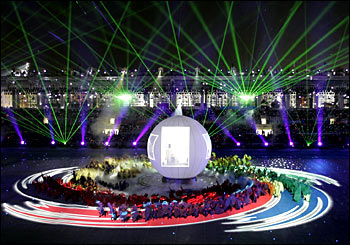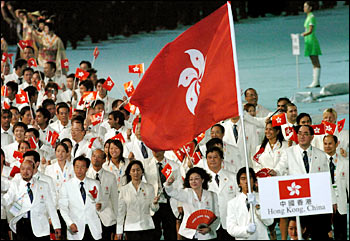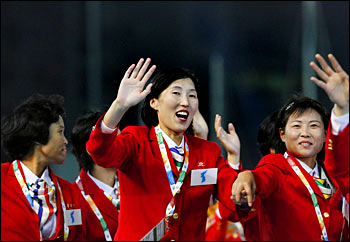The curtain finally went up on the East Asian Games (EAG)
Saturday night as Chinese mainland delegation is set to dominate
the 17-sport gala, including culture-flavored events like dragon
boating and sport dancing.
Chinese Vice Premier Wu Yi
declared the games open.
??
The games marked the sixth time the two Koreas marched together
after they joined hands in the 2000 Olympic opening ceremony.
???
The two delegations marched into the Macao Stadium led by a common
flag featuring blue Korean Peninsula against a white background,
which was hoisted by South Korean men's basketballer Yang Hee-jong
and DPRK women's cager Ryu Hyong-sun.
???
It was a welcome return for the DPRK since the country skipped the
past two editions.
If negotiations between two sides go well on the sideline of the
EAG, a unified team will be sent to the 2006 Asian Games in Doha,
Qatar.
???
Chinese mainland sent a 560-strong squad, including 394 athletes,
to Macao - the largest of all the contingents. Japan and South
Korea have also fielded large teams, but they can't reverse the
fate as playing second fiddle to Asia's sporting superpower.
???
With Chinese mainland winning 32 golds to the United States' 34 at
the 2004
Olympics, it remains a sure bet that it will be the runaway
leader on the medal tally again.
???
Of the 234 events to be contested, Chinese mainland should sweep
over 100 golds if the previous records are anything to go by.
???
At the inaugural games in Shanghai in 1993, Chinese mainland
underlined its strength by taking 105 gold medals - more than four
times the tally of the second finisher, Japan. Also dominant in
1997 and 2001, Chinese mainland had made the EAG an event without
suspense.
???
Chinese mainland's Olympic champion hurdler Liu
Xiang and star diver Guo
Jingjing are the brightest stars here. The tickets for the
two's events had earlier been sold out and their separate arrivals
at the Macao airport sparked off media frenzy.
???
Liu Xiang, co-holder of the 110-meter hurdles world record, has
fared well this year, finishing second in the world championships,
winning Shanghai Grand Prix and sweeping the field in the National
Games nine days ago.
???
Liu, who carried the Chinese national flag in the opening ceremony,
said earlier that he wouldn't have to clock anything close to his
world mark of 12.91 seconds to win in Macao.
???
The other teams - Japan, South Korea, the DPRK, Hong Kong Special
Administrative Region, Macao Special Administrative Region, Chinese
Taipei, Mongolia and Guam - will seek glory in Chinese mainland
delegation's shadow. Japan will battle South Korea to decide who
would follow Chinese mainland closest, while the fourth place is
wide open.
???
After costly nine-year preparation, Macao hopes to be recognized as
a top host and to shake off the tag as a sports nobody.
???
Having won only one title from the past three games, Macao will
look for top honors in Wushu and dragon boating.
???
For Macao, the EAG came with a price.
???
Eleven venues were built from scratch, with the Macao Dome as the
center piece. Costing more than US$75 million, the dome is the most
modern structure in Macao.
???
The Olympic Aquatic Center is equally impressive. The 1,500-seat
center has a 10-lane pool, a 25×25 meter diving pool and a
diamond-vision screen.
 |
 |
 |
 |
 |
 |
(Xinhua News Agency October 30, 2005)